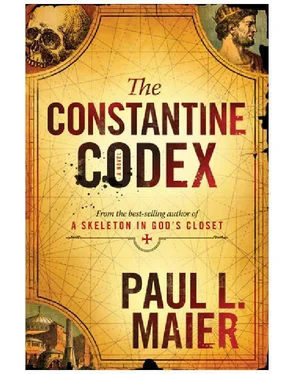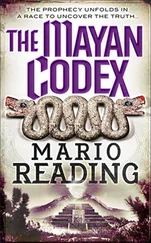Paul Maier - The Constantine Codex
Здесь есть возможность читать онлайн «Paul Maier - The Constantine Codex» весь текст электронной книги совершенно бесплатно (целиком полную версию без сокращений). В некоторых случаях можно слушать аудио, скачать через торрент в формате fb2 и присутствует краткое содержание. Жанр: Триллер, на английском языке. Описание произведения, (предисловие) а так же отзывы посетителей доступны на портале библиотеки ЛибКат.
- Название:The Constantine Codex
- Автор:
- Жанр:
- Год:неизвестен
- ISBN:нет данных
- Рейтинг книги:5 / 5. Голосов: 1
-
Избранное:Добавить в избранное
- Отзывы:
-
Ваша оценка:
- 100
- 1
- 2
- 3
- 4
- 5
The Constantine Codex: краткое содержание, описание и аннотация
Предлагаем к чтению аннотацию, описание, краткое содержание или предисловие (зависит от того, что написал сам автор книги «The Constantine Codex»). Если вы не нашли необходимую информацию о книге — напишите в комментариях, мы постараемся отыскать её.
The Constantine Codex — читать онлайн бесплатно полную книгу (весь текст) целиком
Ниже представлен текст книги, разбитый по страницам. Система сохранения места последней прочитанной страницы, позволяет с удобством читать онлайн бесплатно книгу «The Constantine Codex», без необходимости каждый раз заново искать на чём Вы остановились. Поставьте закладку, и сможете в любой момент перейти на страницу, на которой закончили чтение.
Интервал:
Закладка:
“And why do you need those points?”
“I’m really desperate to get into his archives. Otherwise, he might have said no.”
Shannon merely flashed a wry smile and shook her head.
That, at least, was better than tears.
Jon was not too concerned about preparation for the debate. Although he had not debated often, he could draw on a professional lifetime acquaintance with the sources and histories of both Christianity and Islam, and he was well aware of the unprecedented importance of an encounter like this. No debate of this kind between Christianity and Islam had taken place for centuries. And of course, due to the modern media revolution, the audience for this encounter would dwarf anything previous.
Jon had not read the Qur’an in some years, so it was high time for a reread as cornerstone for whatever preparation he did. Doubtless, his opponent was doing the same with the Bible. Some years earlier, a devout Muslim, hoping to convert Jon, had sent him a beautifully illuminated copy of the Qur’an, along with instructions on how to use it. Read it, for goodness’ sake? Not so fast. First, the reader should always wash his hands before touching it. He should never hold it below his waist. He should never put anything on top of it.
For some reason, Jon had not exactly followed these rules. On the other hand, he had no reason to desecrate it but treated it like the Bible or any other book. A book was a book was a book. Claim more than that, and you’re on to fetishism. He recalled that, in fact, some Christians were also guilty of “bibliolatry,” worshiping the book itself or using it for other than reading as a good-luck charm or talisman against evil.
Or even for fortune-telling, like the fellow who used his Bible for divine guidance on career choices. Praying for revelation, he shut his eyes, opened the Bible, and pointed randomly to a passage. “And he went away and hanged himself.”
Couldn’t be, he thought. I’ll try again.
After repeating the procedure, he opened his eyes and read, “Go, and do thou likewise.”
Impossible! Third time’s a charm. This time he prayed harder, spun himself around three times, flipped through the pages, and pointed. Opening his eyes, he read: “What thou doest, do quickly!”
Jon found the Qur’an about the same size as the New Testament, with a curious arrangement for its chapters: the longer ones first, the shorter last-rather than being placed in chronological order. Much of the historical material covered the same ground as the Bible, but by no means in the same way. There seemed to be dozens of differences, some minor, some major. As he read, Jon wrote down a list of the most important of these, along with locations in the Qur’an through its suras, followed by his own written comments: Noah’s flood did not take place until Moses’ day. (Sura 7:136; 7:59ff) Impossibly late. One of Noah’s sons was drowned because he wouldn’t come along with the rest of the family in the ark. (S 11:43) Nice lesson in obedience! Abraham’s father was not Terah but Azar. (S 6:74) Making him an Arab? Abraham tried to sacrifice not Isaac but Ishmael. (S 37:100ff) To be sure: Ishmael as patriarch of the Arabs. Baby Moses was adopted not by the daughter but by the wife of Pharaoh. (S 28:8ff) Augmenting Moses? Strange for Islam. God struck the Egyptians with not ten plagues but nine. (S 27:12) Zechariah, father of John the Baptist, was not struck dumb for nine months until the birth of John, but only for three days. (S 3:40-41) Interesting sympathy for the voiceless one. Mary gave birth to Jesus not in a cavern-stable but under a palm tree. (S 19:23) Christians believe in three gods: the Father, Jesus, and the Virgin Mary. (S 5:116) Misunderstanding of the Trinity. Jesus did not die on the cross. Someone took his place. (S 4:157) Probably the most decisive difference between the Qur’an and the Bible.
Beyond these differences from Scripture, Jon found the Qur’an even contradicting itself. In Sura 7:54, for example, it took God six days to create the world, but in Sura 41:9, it took him two. And the most notorious, of course, were the so-called satanic verses, in which Muslims were to seek the divine intercession of two goddesses and one god in the Arab pantheon, though later Muhammad was told that this had been Satan interjecting a revelation and that it was thereby abrogated. Salman Rushdie had suffered enough on that one.
At times, Jon was ready to throw down his pen and mutter, “Why even bother debating when the Qur’an has many such problems and is so obviously derivative from prior, biblical sources?”
“Be careful!” Osman cautioned him when he vented such thoughts. “You have to treat the Qur’an very carefully in debate-unlike the Bible-since in Islam, it’s not only authoritative but unimpeachable as God’s only totally reliable and uncorrupted revelation. In that sense, you should compare it not to the Bible, but to Christ himself. Muslims even believe there’s a word-for-word copy of it in heaven-in the original Arabic, of course.”
Jon also noted that many of the prophetic passages in the Bible that predicted a future messiah were transferred from their fulfillment in Jesus and made to refer instead to Muhammad, especially Deuteronomy 18:18: “I will raise up for them a prophet like you from among their brethren; and I will put my words in his mouth, and he shall speak to them all that I command him.”
Nay, more: Muslims even made Jesus himself prophesy the advent of Muhammad each time he referred to the coming Comforter, as in John 14:16: “I will pray the Father, and he shall give you another Comforter that he may be with you for ever.” And here Christians had always thought the Comforter was the Holy Spirit!
Some personal correspondence also took place between Jon and al-Rashid regarding ground rules for the debate. They both agreed not to politicize the exchange or try to make points in the West-versus-Middle East debate as was done so often in Christian-Muslim discussions across the years, since this was to be a purely religious exchange. In view of al-Qaeda and militant Islamic extremism, however, this would be very difficult to accomplish, but at least they could move beyond the “Is Islam a Religion of Peace or War?” question.
The answer to that one, of course, was simply yes, since you could find both peace and war in the Qur’an. But the answer was yes also in Judeo-Christianity, Jon knew, since you could find both also in the Bible. For example, God’s orders through Samuel for Israel to annihilate the Amalekites-“Kill both man and woman, infant and suckling”-were hardly any waving of the olive branch. Still, there was this critically important difference: Jesus never preached violence; Muhammad did.
They also agreed not to use any cheap shots in trying to denigrate each other’s faith, since there were skeletons in both Christian and Muslim closets, primarily due to believers’ not living up to the ideals of their religions. Both traditions had their horror stories. If thoughtful Christians were embarrassed by the Spanish Inquisition, the medieval burning of heretics, or Galileo’s house arrest, thoughtful Muslims were similarly haunted by the Egyptian sultan Hakim’s destruction of Christian holy places in the eleventh century, the mass execution of Christian monks in Tunisia by the al-Muwahhids in the twelfth century, the betrayal and execution of the surrendered Christian garrison on Cyprus by the Ottoman Turks in the sixteenth century despite promises of safe conduct, and the Turkish annihilation of Armenian Christians in the early twentieth century-not to mention all the suicide bombings across the world since.
On the other hand, when al-Rashid wanted even more safeguards, such as no criticisms or negative references whatsoever to either Muhammad or Jesus, Jon drew the line and, as diplomatically as he could, explained that they ought not let their exchange become too bland. He knew, of course, that he had no reason to worry about the personal record of Jesus Christ.
Читать дальшеИнтервал:
Закладка:
Похожие книги на «The Constantine Codex»
Представляем Вашему вниманию похожие книги на «The Constantine Codex» списком для выбора. Мы отобрали схожую по названию и смыслу литературу в надежде предоставить читателям больше вариантов отыскать новые, интересные, ещё непрочитанные произведения.
Обсуждение, отзывы о книге «The Constantine Codex» и просто собственные мнения читателей. Оставьте ваши комментарии, напишите, что Вы думаете о произведении, его смысле или главных героях. Укажите что конкретно понравилось, а что нет, и почему Вы так считаете.












